 Sunday June 19th 2016, Can Dialectics Break Bricks Cinema: Charles, Dead or Alive (Charles mort ou vif). Directed by Alain Tanner, 1970, 93 minutes. In French with English subtitles. Door opens at 8pm, film begins at 9pm. Free admission.
Sunday June 19th 2016, Can Dialectics Break Bricks Cinema: Charles, Dead or Alive (Charles mort ou vif). Directed by Alain Tanner, 1970, 93 minutes. In French with English subtitles. Door opens at 8pm, film begins at 9pm. Free admission.
The debut feature film by the great Swiss director Alain Tanner (Jonas will be 25 in the Year 2000, In the White City). Unseen for decades, this is an incredibly rare screening of this film about a businessman who becomes disillusioned with his lifestyle and throws his destiny to the wind to see where he ends up. In this film, Tanner already sets up the major theme that runs through all his films… describing the inner road and turmoil that anyone has to go through when they decide to break with society and follow their convictions uncompromisingly to the bitter end.
Although shot in Switzerland, the backdrop of the film is the volatile uprisings and demonstrations that were happening in France in 1968. This one is a forgotten gem that few people have had the chance to see in a cinema. Shot in a grainy and austere black and white, it’s a snapshot of the dynamic sociopolitical landscape of late 1960s Europe as the old world is hijacked and overtaken by modernization and American economic globalization. An extremely rare glimpse into the counter-culture movements of the 60s.
Film night at Joe’s Garage, cozy cinema! Doors open at 8pm, film begins at 9pm, free entrance. You want to play a movie, let us know: joe [at] squat [dot] net


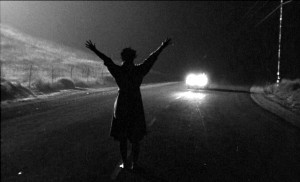
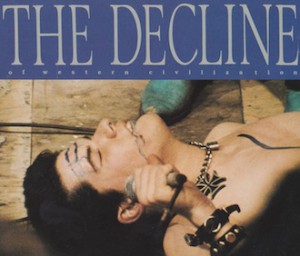
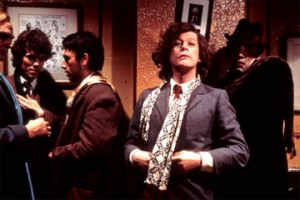
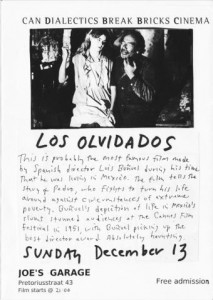 Sunday December 13th 2015, Can Dialectics Break Bricks Cinema: Los Olvidados. Directed by Luis Buñuel, 1950, 80 minutes, In Spanish with English subtitles. Door opens at 8pm, film begin at 9pm. Free admission.
Sunday December 13th 2015, Can Dialectics Break Bricks Cinema: Los Olvidados. Directed by Luis Buñuel, 1950, 80 minutes, In Spanish with English subtitles. Door opens at 8pm, film begin at 9pm. Free admission.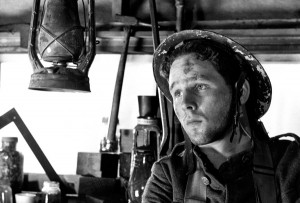 Sunday November 15th 2015, Can Dialectics Break Bricks Cinema: Johnny Got His Gun. Directed by Dalton Trumbo, 1971, 111 minutes. In English. High-definition screening. Free admission. Door opens at 20:00, Film starts at 21:00.
Sunday November 15th 2015, Can Dialectics Break Bricks Cinema: Johnny Got His Gun. Directed by Dalton Trumbo, 1971, 111 minutes. In English. High-definition screening. Free admission. Door opens at 20:00, Film starts at 21:00.

